| "We don’t tell
lies ... up to a point" November 9th, 1998 The statement in a recent Asiaweek interview by the Deputy Executive Chairman of local Malay-language daily Utusan Malaysia, Zainuddin Maidin had me in gasps. He said that there is no government interference in the newspaper’s day-to-day operations and refuted allegations that his paper is not telling the truth. "We’re biased, " he admitted. "But we don’t tell lies."
"Hong Kong belongs to us, doesn’t it, Salter?" "Definitely, Lord Copper" "Let me see, what’s the name of that place ... the capital of Japan ...Yokohama, isn’t it?" "Up to a point, Lord Copper."
That is probably why the blatant and obviously hostile attacks on Anwar Ibrahim in the weeks following his sacking last September shocked so many. The meek, docile, self-censored, ‘responsible’ journalism that Malaysians had tolerated so long suddenly became bold, fiery and downright coarse and vulgar. In lurid and graphic detail, the newspapers all gave us crash courses in sodomy and masturbation - we were all told who Anwar sodomised, how many times, where, when, how and which orifices and protuberances were involved.
The fact that the majority of shares of the television company were controlled by the ruling party did not, I’m sure, influence this little scheduling error. The war of words between the Anwar supporters and the government supporters was to begin - and it was a promising little war. Unfortunately for the Anwarites, the government had outflanked their enemy weeks before by getting rid of a number of key editors which they felt would not be so compliant in the coming trial by media. Soon, affidavits of sexual misconduct were hotly discussed and deliberated fully in the newspapers - even before they had appeared in any court of law. Lawyers raised a howl of outrage. The normally sober Bar Council issued a scathing statement viewing ‘with dismay’ the publication of the affidavits, which they regarded as ‘most unusual and unprecedented’ and may have even been ‘subjudice and in contempt of court’. The Council had this radical idea that a trial by media was ‘a breach of the rules of natural justice and fair play’ and infringes ‘the constitutional right of a person to defend himself’.
With the press muzzled and only barking up where its masters told it to bark, an avenue for the dissatisfaction of Anwar supporters was firmly shut. They instead flocked by the thousands to his home, to community halls around the country and, finally, to the streets. And they took to the Internet. Anwar websites were already on-line the evening he was sacked. The government was not so swift - the Prime Minister’s official home page still had glowing tributes to his sacked Deputy weeks after his dismissal!
Whatever these ‘news’ reports were meant to accomplish, they certainly were successful in convincing those 100,000 people not to believe them anymore. The gag order by the judge in the Anwar trial, Augustine Paul, to halt to all public comments on sodomy and corruption charges faced by Anwar when he was finally brought before a court of law stemmed the steady flow of pornography from the local press (and, mostly, from Mahathir). But the lies certainly didn’t stop. Hundreds of Muslim women in veils protesting Anwar’s arrest, quietly singing and chanting under a tree in front of the Royal Palace, are "prostitutes" screamed Utusan Malaysia - despite the Kuala Lumpur police chief issuing a statement denying that any prostitutes were involved in the demonstration. (This statement, by the way, did not see the light of day in any of the mainstream Malay or English press - and don’t even dream there was a retraction from Utusan Malaysia). It makes one wonder if the ‘prostitutes’ were actually the ones with the cameras, notepads and press tags.
I must concede that that this kind of naked hostility is not a common trait in most journalists. Having been a journalist myself and being in a profession where I have to work with journalists on a regular basis, I know that most journalists are ethical and professional. Many of them feel just as strongly for social justice and democratic freedoms as any Reformist I know. They had been fighting these causes for years - at times when many of the champions of the Reform movement today were breaking up conferences on East Timor independence, calling human rights activists traitors and urging the use of the ISA on party opponents.
I say the article was brave because, while not exactly supportive of the Reformists, it was probably the first one I had read in the mainstream media that indicated that there were ordinary people who were not just concerned about Anwar but about freedom and justice in Malaysia as well. The writers questioned the usual party line parroted in the media that 22 million Malaysians have unswerving loyalty to the government and unshakable faith in its democratic institutions - and the answers they got may have convinced many that, perhaps, this key issue here is not only about Anwar Ibrahim - but about the far broader issues of justice, freedom and democracy.
And what were the corresponding headlines in the local Malay press? "Dakwaan Salah Laku Seks Anwar: Mohd Said Percaya" ("I believed sex accusations: Mohd Said") said local Malay daily Berita Harian. "Saksi Yakin Tuduhan Benar" ("Witness believed accusations") Utusan Malaysia declared. And not much said about that tiny detail regarding committing perjury if ordered to do so by the Prime Minister.
In one of the sessions in court last week, Anwar actually turned to reporters in the gallery, pleading with them to be more ‘objective’. Complaining that local media reports on his trial were "terrible", he quickly smiled and said "I understand it’s not your fault. It’s your editors." Today, November 8th 1998, Southeast Asian journalists launched a new regional alliance in Bangkok to fight for press freedom and to monitor attacks on reporters. The Southeast Asian Press Alliance (SEAPA) will set up a secretariat in Bangkok next year to urge governments to overturn repressive media laws and monitor attacks on journalists. Delegates from independent journalist associations in the Philippines, Indonesia and Thailand will steer the SEAPA, formed during a weekend seminar here on press freedom in Southeast Asia organised by the Reporters’ Association of Thailand. I don’t know why no Malaysian journalist associations were represented at the meeting. Perhaps they felt out of place at a forum discussing press freedom. But if our own local journalists feel that the fight for press freedom is a futile one, we as readers have a duty to prove them wrong. Thai Foreign Minister Surin Pitsuwan, a former journalist himself, told the forum it is the responsibility of each member of society "to safeguard the freedom of the press" which he said was "a basic human right". People just don’t like being lied to, being deceived and having their intelligence insulted. Malaysians have resorted to using the Internet as the printing press of the nation, photocopying, faxing, posting and distributing news and views they cannot find in their own local media. They have taken it upon themselves to assume a task which the local press have seen fit to neglect. If I were a journalist I would be ashamed of that. And until journalists stand up to their editors and to the people that rule our editors, readers will just continue not buying their papers and seek elsewhere for truth. Because lies, vested interests, hidden agendas and plain old official propaganda that are disguised as Truth can only be believed - up to a point.
|
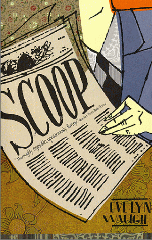 The
image of poor Zainuddin pleading for the independence and sovereignty of
his newspaper reminded me a lot of Salter - the servile, sycophantic Foreign
News editor of the ‘Daily Beast’, the fictional British newspaper in Evelyn
Waugh’s classic satire on journalism "Scoop". There is a scene
from the book where Salter is talking with Lord Copper, the all-powerful,
despotic, senile and dim-witted owner and publisher of the newspaper. While
Lord Copper was talking about how his newspaper must make a stand for ‘strong
government’ and ‘self-assertion’, Mr Salter’s side of the conversation
was limited to delighted expressions of assent and enthusiastic agreement.
Every time Lord Copper was right, Salter would say, "Definitely, Lord
Copper". When he was wrong, Salter would say "Up to a point,
Lord Copper."
The
image of poor Zainuddin pleading for the independence and sovereignty of
his newspaper reminded me a lot of Salter - the servile, sycophantic Foreign
News editor of the ‘Daily Beast’, the fictional British newspaper in Evelyn
Waugh’s classic satire on journalism "Scoop". There is a scene
from the book where Salter is talking with Lord Copper, the all-powerful,
despotic, senile and dim-witted owner and publisher of the newspaper. While
Lord Copper was talking about how his newspaper must make a stand for ‘strong
government’ and ‘self-assertion’, Mr Salter’s side of the conversation
was limited to delighted expressions of assent and enthusiastic agreement.
Every time Lord Copper was right, Salter would say, "Definitely, Lord
Copper". When he was wrong, Salter would say "Up to a point,
Lord Copper." 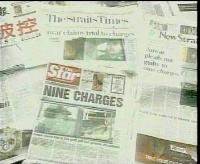 The
phrase "Up to a point ...." crops up a lot in the book - as,
I’m sure it would in many conversations between our country’s top editors
and our top leaders. Malaysian journalism has taken the skill of writing
between the lines - saying something without actually saying it - to an
art form. And Malaysians have always found that the best news is usually
nestled reading between those lines.
The
phrase "Up to a point ...." crops up a lot in the book - as,
I’m sure it would in many conversations between our country’s top editors
and our top leaders. Malaysian journalism has taken the skill of writing
between the lines - saying something without actually saying it - to an
art form. And Malaysians have always found that the best news is usually
nestled reading between those lines. 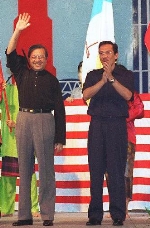 The
trial by media had actually begun many months before. There were previously
two golden rules governing what headline stories went on the front page
of a local newspaper. Rule Number 1 was that there must be a quote from
Mahathir. Rule Number 2 was, if the he wasn’t in town, there must be a
quote from Anwar. However, by the middle of this year, we suddenly noticed
less and less of our Deputy Premier in the papers - let alone the front
page. The only memorable news about Anwar in the weeks leading up to his
sacking were denials by him and Mahathir that there was no rift between
them and Anwar was not being called on to resign. Mahathir was even quoted
as willing to "kiss him on the street" to prove the point - a
very risky proposition, considering the nature of the sexual accusations
that were to emerge later.
The
trial by media had actually begun many months before. There were previously
two golden rules governing what headline stories went on the front page
of a local newspaper. Rule Number 1 was that there must be a quote from
Mahathir. Rule Number 2 was, if the he wasn’t in town, there must be a
quote from Anwar. However, by the middle of this year, we suddenly noticed
less and less of our Deputy Premier in the papers - let alone the front
page. The only memorable news about Anwar in the weeks leading up to his
sacking were denials by him and Mahathir that there was no rift between
them and Anwar was not being called on to resign. Mahathir was even quoted
as willing to "kiss him on the street" to prove the point - a
very risky proposition, considering the nature of the sexual accusations
that were to emerge later. 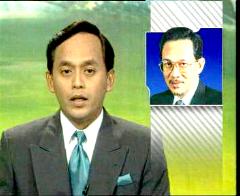 Being
masters at reading between the lines, we all knew Anwar’s days were numbered.
But we certainly didn’t expect him to be sacked - now that was news.
Though local television station TV3 certainly didn’t think so. The news
of the country losing its Deputy Prime Minister was the third or fourth
segment in the TV3 news that evening - after the top news of a change in
the elementary school curriculum and some insignificant official opening
by some insignificant Minister in some insignificant place I can’t even
remember. It was as though the producers thought that, by slotting it somewhere
in the middle, people might somehow miss that little news item about the
destruction of the country’s second most powerful man.
Being
masters at reading between the lines, we all knew Anwar’s days were numbered.
But we certainly didn’t expect him to be sacked - now that was news.
Though local television station TV3 certainly didn’t think so. The news
of the country losing its Deputy Prime Minister was the third or fourth
segment in the TV3 news that evening - after the top news of a change in
the elementary school curriculum and some insignificant official opening
by some insignificant Minister in some insignificant place I can’t even
remember. It was as though the producers thought that, by slotting it somewhere
in the middle, people might somehow miss that little news item about the
destruction of the country’s second most powerful man. 
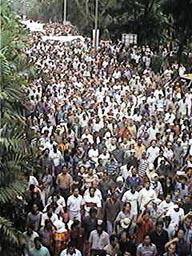 The
war of words continued. Gatherings of many thousands of people were reported
as being attended by a few hundred, sometimes a few dozen, Anwar supporters.
The mammoth gathering at the National Mosque and Dataran Merdeka on the
day of Anwar’s arrest - which eyewitness reports indicated could have easily
numbered 100,000 - were reported in the local press as being attended by
5,000 people. Not only that, a Minster was even reported to have said that
they were mostly foreigners!
The
war of words continued. Gatherings of many thousands of people were reported
as being attended by a few hundred, sometimes a few dozen, Anwar supporters.
The mammoth gathering at the National Mosque and Dataran Merdeka on the
day of Anwar’s arrest - which eyewitness reports indicated could have easily
numbered 100,000 - were reported in the local press as being attended by
5,000 people. Not only that, a Minster was even reported to have said that
they were mostly foreigners! 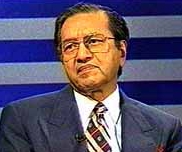 During
all this, Mahathir of course continued with his ranting and raving against
the foreign press for their lies and unfairness. It was therefore only
a matter of time before a local journalist would have to echo His Master’s
Voice and follow suit - and he even managed to out-do the Prime Minister.
Malaysian journalism finally sunk to its lowest depths ever when an opinion
piece in the New Straits Times actually called for ‘errant’ journalists
to be detained without trial under the Internal Security Act (ISA). These
are journalists asking for other journalists to be detained without trial.
And these people are supposed to be the guardians of the freedom of speech,
thought and expression in Malaysia? Who guards the guardians, I wonder.
During
all this, Mahathir of course continued with his ranting and raving against
the foreign press for their lies and unfairness. It was therefore only
a matter of time before a local journalist would have to echo His Master’s
Voice and follow suit - and he even managed to out-do the Prime Minister.
Malaysian journalism finally sunk to its lowest depths ever when an opinion
piece in the New Straits Times actually called for ‘errant’ journalists
to be detained without trial under the Internal Security Act (ISA). These
are journalists asking for other journalists to be detained without trial.
And these people are supposed to be the guardians of the freedom of speech,
thought and expression in Malaysia? Who guards the guardians, I wonder.
 One
or two of these lonely, independent voices in the local media do manage
to get heard on rare occasions. There was a brave article that appeared
in the ‘Life and Times’ section of the New Straits Times on November
4 that took a candid look at the feelings and opinions of the various people
who flocked to the courthouse that week. The writers quoted people saying
things such as "I am here to support Anwar", "We don’t have
the freedom to speak up", "It’s impossible to be a journalist
here", "I no longer have any faith in the system - the only way
left is to change it altogether".
One
or two of these lonely, independent voices in the local media do manage
to get heard on rare occasions. There was a brave article that appeared
in the ‘Life and Times’ section of the New Straits Times on November
4 that took a candid look at the feelings and opinions of the various people
who flocked to the courthouse that week. The writers quoted people saying
things such as "I am here to support Anwar", "We don’t have
the freedom to speak up", "It’s impossible to be a journalist
here", "I no longer have any faith in the system - the only way
left is to change it altogether". 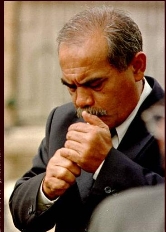 Articles
such as those are a candle in the darkness that envelopes Malaysian journalism
today. Unfortunately, isolated acts of independence like that are submerged
in the torrent of propaganda that tries to disguise itself as news coverage.
One of the shocks from last week’s sessions in court was the admission
on November 5 by the former head of the Special Branch Datuk Mohd Said
Awang that he may lie in court if asked to do so by the PM. This was the
top story in all the international news wire services that day, as well
as in the regional newspapers the next day. "I might lie if asked
to, says witness" was the Singapore Straits Times headline.
Articles
such as those are a candle in the darkness that envelopes Malaysian journalism
today. Unfortunately, isolated acts of independence like that are submerged
in the torrent of propaganda that tries to disguise itself as news coverage.
One of the shocks from last week’s sessions in court was the admission
on November 5 by the former head of the Special Branch Datuk Mohd Said
Awang that he may lie in court if asked to do so by the PM. This was the
top story in all the international news wire services that day, as well
as in the regional newspapers the next day. "I might lie if asked
to, says witness" was the Singapore Straits Times headline.
 It
is this kind of editorial wool-pulling over the eyes that has made so many
people angry at the press. Some have reacted passively - by simply not
buying the papers anymore. The Opposition parties had singled out Utusan
Malaysia as particularly vile and initiated a campaign encouraging
people to boycott the paper. Others have resorted to more dramatic displays
of frustration. An Utusan Malaysia vehicle was pelted with rocks
when it entered Kampong Baru on October 24th - the scene of a violent confrontation
between Reformasi supporters and the riot police. A Reformasi demonstration
in Kampong Baru last Saturday saw demonstrators burning copies of Utusan
Malaysia. One person I know takes copies home from the office to be
used as cat litter - proudly displaying his unique show of defiance to
friends who come to his home.
It
is this kind of editorial wool-pulling over the eyes that has made so many
people angry at the press. Some have reacted passively - by simply not
buying the papers anymore. The Opposition parties had singled out Utusan
Malaysia as particularly vile and initiated a campaign encouraging
people to boycott the paper. Others have resorted to more dramatic displays
of frustration. An Utusan Malaysia vehicle was pelted with rocks
when it entered Kampong Baru on October 24th - the scene of a violent confrontation
between Reformasi supporters and the riot police. A Reformasi demonstration
in Kampong Baru last Saturday saw demonstrators burning copies of Utusan
Malaysia. One person I know takes copies home from the office to be
used as cat litter - proudly displaying his unique show of defiance to
friends who come to his home.  Anwar
himself has been more understanding of the situation local reporters face.
During the massive demonstration at the National Mosque on September 20th,
just hours before Anwar was arrested, a TV3 crew was pelted with drink
cartons to shouts of Penipu!" ("Liars!") and "Anjing!"
("Dogs!") from the crowd. Fortunately, Anwar ordered them to
calm down, quipping "Let them do their job ... I definitely know that
particular crew secretly supports me!"
Anwar
himself has been more understanding of the situation local reporters face.
During the massive demonstration at the National Mosque on September 20th,
just hours before Anwar was arrested, a TV3 crew was pelted with drink
cartons to shouts of Penipu!" ("Liars!") and "Anjing!"
("Dogs!") from the crowd. Fortunately, Anwar ordered them to
calm down, quipping "Let them do their job ... I definitely know that
particular crew secretly supports me!"